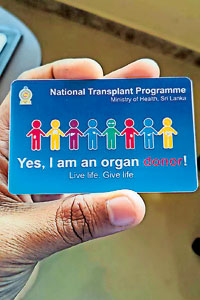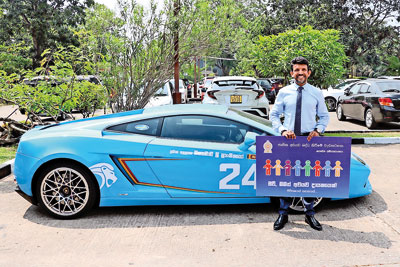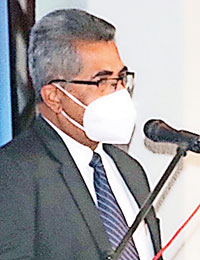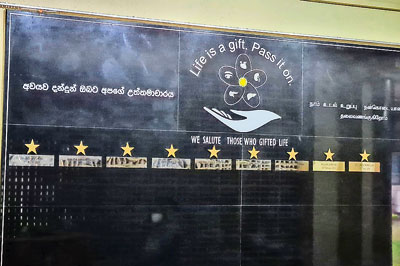News
Launch of ‘National Organ Donor Card’ gives fresh lease of life to many
A landmark event to boost organ donations from deceased donors and give a fresh lease of life to numerous men, women and children, who have no other option but wait in hope for such an organ, was held without much fanfare recently.
The very first colourful ‘National Organ Donor Card’ being presented to the Health Ministry Secretary, Major-General Sanjeewa Munasinghe on February 19 at the Sri Jayewardenepura General Hospital (SJGH) was the highpoint of an event marking the fourth National Organ Donor Day 2021.

The colourful card which makes the holder a participant in a vital programme which saves lives
The launch followed tributes being paid at the ‘Memorial Wall for Deceased Donors’ at the SJGH by the gathering which included ministry and SJGH top officials, celebrities, donor families and healthcare staff of regional hospitals.
Celebrity racing driver Dilantha Malagamuwa is the Brand Ambassador who will promote the National Organ Donor Card.
On Monday, the Sunday Times spoke to the silent activists of the SJGH who have been toiling to get the National Organ Donor Card, a crucial part of the Deceased Donor Organ Donation Programme off the ground.
While some of the patients with kidney or liver failure may benefit from organ or part-organ donations from family members, what would happen to those who are in the vice-like grip of end-stage heart or lung failure? With death staring them in the face, the only option is a donation from a deceased donor.
This is why an earnest appeal is going out to people to join the Deceased Donor Organ Donation Programme and secure the slim National Organ Donor Card.
In the unfortunate event of such a donor becoming brain dead due to a serious road traffic accident or such circumstance, his/her organs would give life to others without going into the grave. (Please access for FAQs on the donor programme and for the donor form)
For loved ones of the bereaved, solace comes from knowing that the person “lives” in others through the donated organs.
The importance of a robust Deceased Donor Organ Donation Programme is driven home through the tale of 34-year-old Sunil* from Maharagama.

Celebrity racing driver Dilantha Malagamuwa with the organ donor card
In 2015, life was good. He was married and with plans and hopes for the future, he sought employment in South Korea. The first sign of trouble was severe back pain.
Diagnosed with major kidney disease (only 20% of his kidneys were working), he returned to Sri Lanka very ill and began dialysis immediately.
He says that there were no symptoms except that from the time he was young there would be froth whenever he passed urine and he could never gain weight.
Life ground to a halt. His savings from his stint abroad slowly dissipated. He could not work, he was weak and had to undergo dialysis twice a week. His mother sought employment in Israel to sustain his family.
Then came the news that the SJGH had a kidney for him from a deceased donor and he underwent a transplant on March 27, 2017.
Now he runs a small bookshop, while there is also fulfilment for he and his wife have a 2½-year-old daughter.
In Kohuwela, Brother W. Benedict Kurera (60) is yearning to go back to his work at an orphanage in Maggona. It was in May 2017 that the doctors realized that all was not well with him when tests found that he was passing protein with his urine. Both his kidneys were not functioning and he needed dialysis, initially once a week, then twice a week and in the last six months thrice a week.
“I was tired all the time. My abdomen and my feet were swollen,” says Brother Kurera, recalling how there was hathiya (panting) and he was itching all over his body.

Dr. Sanjeewa Munasinghe addressing the gathering
Brother Kurera needed an urgent kidney transplant. Several appeals he published in the newspapers to no avail.
“It was the day before the church feast in February last year. I was in my home town of Kimbulapitiya in Negombo,” he says, reliving those emotional moments during vespers (evening prayers) when the “unexpected” call came that he could have the transplant on February 11 because of a donation from a deceased donor.
Before looking at the structure and process of the Deceased Donor Organ Donation & Transplantation Programme SJGH’s Consultant Anaesthetist Dr. Chamila Pilimatalawwe says that end-organ failure is a global epidemic and the answer is organ donation.
“This is the process of surgically removing an organ from a donor and transplanting it in a recipient because the latter’s organ has failed. Organ transplantation has changed the lives of many due to advancements in transplant immunology; immunosuppressive drugs; surgical techniques; organ preservation; and increased organ donation,” she says.
The SJGH team takes the Sunday Times through a presentation starting with the classification of ‘potential donors’:
Organ donors – from whom organs such as the kidneys commonly, liver, heart, lung, bowel/intestine and pancreas may be extracted. Some of these organs (kidneys and part of the liver) can be donated by a ‘live donor’, while all these organs can be extracted from a ‘deceased donor’.
Tissue donors – from whom tissues such as skin, heart valves, ligaments, bones, veins, corneas, etc. may be extracted.
Delving into organ donations from ‘deceased donors’, Dr. Pilimatalawwe says that in many countries people donate their organs after death, having intimated to their loved ones, verbally or in writing, of their wishes before their death. This is where the donor card would come in handy for anyone who wishes to “bequeath” their organs once they are no more. Organs from a ‘deceased donor’ are extracted once there is brain-stem death or cardiac death.
“A brain-dead donor would be someone who has been critically ill in the Intensive Care Unit (ICU), who has irreversible damage to the brain, with no hope of spontaneous recovery. The organs would be kept viable with the support of ventilation and cardiac support,” she says.

The ‘Memorial Wall’ honouring deceased donors
Pointing out that if the organs of brain-dead person could be donated, there would be a reduction in the transplantation waiting list; the cost incurred in dialysis of patients suffering from chronic kidney disease, etc., could be cut down; and people occupying precious ICU beds while being in a persistent vegetative state would be reduced providing an opportunity for other needy patients, she says that such donations would also have a positive effect on the bereaved family, while putting a halt to live donor organ trafficking.
In a good Deceased Donor Organ Donation Programme, there would be multidisciplinary team participation – Anaesthetist/intensivist; neurosurgery and neurology team; Judicial Medical Officer (JMO); transplant surgeons; nephrologists; hepatologists; cardiologists; pulmonologists; endocrinologists; gastroenterologists; transfusion medicine specialists/immunologists; microbiologists; psychologists & counsellors; and donor/transplant coordinators.
Underscoring the fact that the “vital cycle” in donation and transplantation has many links, she says that it starts with society and its attitudes to such donations; donors and securing organs; then retrieval of organs followed by sharing and allocation, after which comes transplantation and then follow-up when the recipient gets back to society. If there are no donors, there will be no transplants and many who need organs would die.
Sri Lanka needs a strong structure with the Health Ministry as the “pivot” around which a dynamic organ donor programme would revolve, with multi-organ procurement facilitating a vibrant transplantation programme, it is understood.
Dr. Pilimatalawwe’s message is succinct and clear – if such a vibrant Deceased Donor Organ Donation Programme is up and running in the country, just one donor would be able to save eight lives in the future.
(* Name changed to protect identity)
| Steps to make it an effective programme When asked by the Sunday Times what measures should be taken by Sri Lanka to implement a good organ donation programme, here is what the Sri Jayewardenepura Hospital team suggests: Action 1: Promote the role of transplant donor coordinators in every hospital where there is potential for organ donation. Design indicators to monitor this action. Action 2: Promote quality improvement programmes in every hospital where there is potential for organ donation. Action 3: Encourage best practices on living donation programmes and support registers of living donors. Action 4: Improve knowledge and communication skills of health professionals and patient support groups about organ transplantation. Action 5: Enhance the organizational models of organ donation and transplantation in the hospital Action 6: Promote all aspects of transplantation medicine. Action 7: Facilitate the interchange of organs among hospitals Action 8: Evaluate post-transplant results. Action 9: Legislative framework Action 10: Promote a common accreditation system for organ donation/procurement and transplantation programmes. | |


